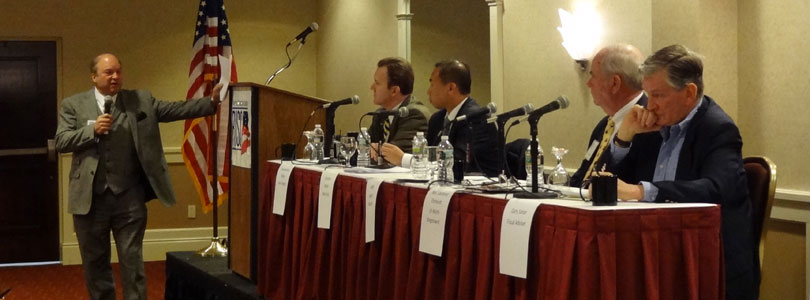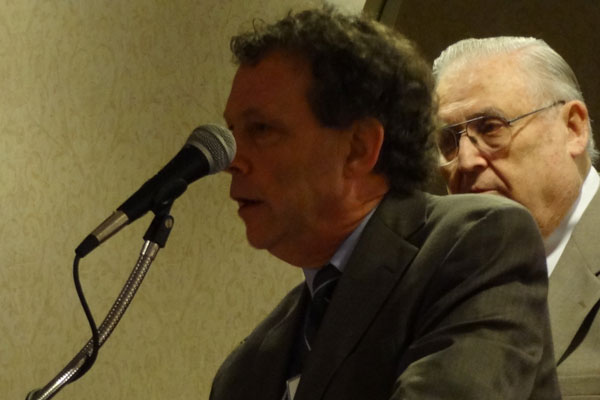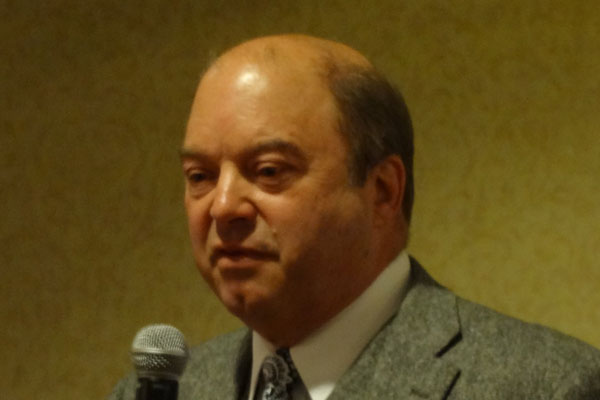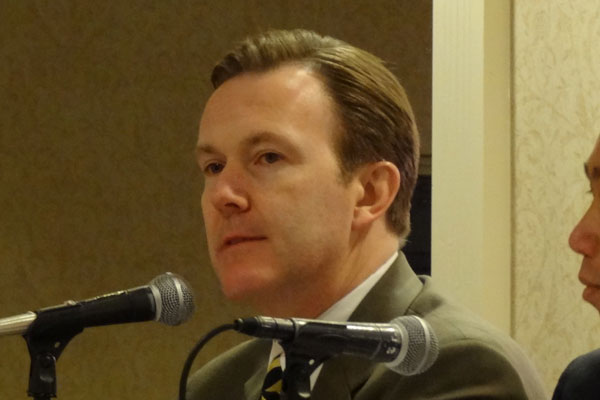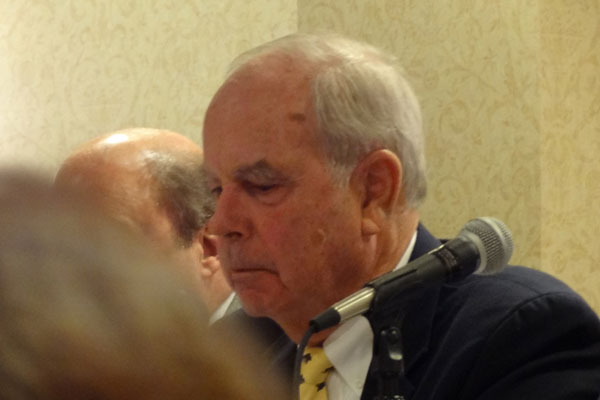03/10/12 – RISC Winter Meeting
9:05 a.m.
It’s always the meetings for which you’re running late that start on time…
Harry Staley of the Rhode Island Statewide Coalition has started the program with various announcements and now introductions.
9:08 a.m.
Staley just asked the elected officials to rise; then he asked the media members to do the same. Jim Baron of the Pawtucket Times declined to stand; I raised an arm (laptop on my lap and all).
9:10 a.m.
RISC’s general council, Robert Senville, is telling the audience about “probably the most important Supreme Court decision of the last decade,” Citizens United. RISC is concerned that the elimination of limits came with a requirement for disclosure.
9:11 a.m.
He’s speaking against the campaign finance regulations moving through the General Assembly, referencing cyberstalking of Doug Gablinske and a supporter, a bomb on the property of Harriet Lloyd (RISC), intimidation of people who supported pension reform (such as Collette vacations and Crossroads homeless shelter).
He asks donors in the room to speak with him if they are concerned about it, so they can find ways to address their concerns.
9:15 a.m.
As the introductions are made, I’ll note that there are approximately 175 people in the room, filling the tables with lots of familiar faces on what can reasonably called the center-right in Rhode Island.
9:17 a.m.
Central Falls Receiver Robert Flanders is acting as MC/panel leader. He’s stepped down from the podium and is giving opening remarks with a wireless mic on the main floor. (Those who oppose his actions in Central Falls may see some significance in the fact that speaking from the floor, though perhaps a statement of humble demeanor, makes it more difficult for the people in the back to see what he’s doing.)
9:22 a.m.
Flanders is giving background of Central Falls’ bad position and the “important” legislation to give the state the power to step in if “triggers” suggest it. He says there are many communities in which the triggers currently appear to be present.
He doesn’t think the receivership mechanism will be needed in most cases.
“So called bankruptcy option, far from being a bad thing, is a necessary one.”
9:26 a.m.
“The receiver has no power to alter contracts. The one power that the receiver has is to take the city into bankruptcy. The other power [that he has] is to reduce all of the elected officials to an advisory status.”
9:28 a.m.
“On the first day” that a receiver files for bankruptcy, he can alter “the contracts that are causing the community to suffer deficits.”
9:30 a.m.
Receivership is the only “vehicle” able to bring a municipality into Chapter 9 bankruptcy/restructuring. (It should be noted that that’s a function of the law that created it, I believe, not a natural state of Constitutional being.)
9:31 a.m.
“You can’t liquidate a city like you can a private organization and just say, “Voila!”
9:33 a.m.
The leverage shifts to the city: “It’s only what the city wants to pay that matters at that point.” “Suddenly, we were able to get concessions from our unions that would have been unthinkable. The bankruptcy provided the cover: it’s either a haircut or a beheading.” [Laughter.]
9:35 a.m.
“Why is it the conventional wisdom that this is a bad thing?” “If it was called ‘restructuring,’ ‘reorganization,’ [etc.], we’d be doing more of it.”
“The fear is that ‘bankruptcy’ will prevent people from wanting to live and work there, but think about it: would you want to live in a community that’s constantly in the red and can’t turn itself around?”
[Note: I agree with this part of his point, although the receivership route goes too far in the power that it gives an unelected receiver.]
“People were going to have payless paydays.” “Who wants to take a 50% reduction in their pensions, but do you want to open an envelope and it’s empty?”
9:37 a.m.
“We’re at the point that we can’t tax our way out of this.” “We can’t go to the nonprofits and ask them to donate the money.” There’s not enough resources there.
“Stigma schmigma; get over it. It’s a reorganization, a restructuring. It happens all the time in the private world.”
9:38 a.m.
“There is life after receivership.” There’s no guarantee that cities/towns won’t fall back into it (after the 5-year oversight period ends).
Consolidation has to happen in the future, but receivership is a necessary first step: “Once the bride can fit into the wedding dress, it’s a lot easier to marry up the communities.”
9:39 a.m.
Predicts we’ll see school and municipality consolidation for administration. “That’s underway in Central Falls.” “This isn’t Noah’s Arc; we can’t afford to have two of everything.”
9:40 a.m.
There doesn’t have to be wholesale loss of elected officials’ power. That happened in Central Falls, he says, because the elected officials fought everything tooth and nail.
He thinks cities and towns should negotiate with the governor/administration.
“What mayor’s going to ask the state for receivership if he’s going to lose all his power.” On the panel behind Flanders, Woonsocket mayor Leo Fontaine raised his hand. [Laughter.]
9:42 a.m.
Outside of bankruptcy/receivership, all of the arguments that “are now carrying the day with Judge Taft-Carter” fall away.
In the normal state of negotiations, labor issues come before state judges, who have “the biggest pensions of all.” He called it an away game where the guys from the front office are refereeing the game.
9:45 a.m.
The GA’s legislation giving bond holders protection in these cases prevents a “contagion” of interest rate increases across the state.
9:46 a.m.
“These are problems the whole country are facing. I predict, as all of us become familiar with this chapter 9 action, we’re going to see a lot more of it.”
9:47 a.m.
“Finally, there’s a way to deal with these contracts that are like phone books after so much has been added into them.”
9:48 a.m.
Woonsocket Mayor Leo Fontaine is now up.
Right behind his desk is a big copy of the Declaration of Independence. He often thinks that those men, many not famous, must have felt themselves to be in a situation like this.
“I think it’s almost worse now. If we were to have a tea party now, we’d have to get a permit, we’d have to hire a duty officer, DEM would fine us for throwing anything into the bay, the tea guild would file a grievance.” All of the things that we’ve tried to provide (welfare, labor promises) “we find ourselves collapsing under those promises.”
9:51 a.m.
What happens in all of our cities and towns affects all of us. “If somebody sneezes in Smithfield, somebody in Westerly gets a cold.”
9:52 a.m.
When he entered office, like Central Falls, he considered filing for bankruptcy. He told his officers to wait until the General Assembly was out of session so they wouldn’t do something to come in and stop it.
“But the stars aligned,” and the General Assembly and governor actually did something more positive. However, “I don’t see the problem of solving government by inserting more government.”
9:54 a.m.
Cities and towns are the ones at the bottom of the hill that you-know-what flows down.
Gov. Carcieri made a “valiant effort” to force municipalities to make the necessary cuts but reducing aid, but it was a little shortsighted.
In Woonsocket, they had to hold down taxes, because they were already so high. The city is about 50% less staffed than it was at the peak 10 years ago.
9:57 a.m.
“It’s the burden and walls” in cities and towns that have gotten us to this point. He was talking about how Woonsocket was starting to put things back together before being whacked by the school committee’s woes.
Referring to Flanders’ marriage analogy, he says, “we may be able to dress the bride up, but the dowry is going to kill you.”
[By the way, I notice Andrew Morse is offering an alternative liveblog… although I suspect it’s more the truth that I’m the alternative, in that balance.]
9:59 a.m.
“I don’t want to be the heartless Republican, here, but we’ve got to look into” controlling the human services spending. [Applause.]
He gives an example of a resident who was having her water turned off. In talking to her, he discovered that she had just moved up from Texas recently because she has a special needs child, and people told her that Woonsocket, Rhode Island, specifically, would be a great place to go.
That’s the reputation we have across the country, he says.
10:02 a.m.
Another example is an email from somebody else losing his water, talking about his financial difficulties, and at the end of the email, it said “sent from my iPad.”
Another one had a new iPhone (runs her “about $100 bucks” per month). She also smokes a couple of packs of cigarettes a day. “Maybe if you dropped your cell phone and quit smoking, you’d be able to pay all your bills… and be happier to boot.”
He used the analogy, earlier, of the instruction on an airplane that parents should secure their own life devices and then help their children.
10:04 a.m.
Cranston Mayor Allan Fung. “Just to let you know where Cranston is. We’re not Central Falls” and they don’t have the problems of Woonsocket or Providence. But they’re not out of the woods. “Every city of town in RI and the USA is facing the same problems.”
“We don’t learn from the histories and the mistakes that we’ve made in the past.” [That, by the way, is my argument against receivership, as constituted.]
10:05 a.m.
Municipalities are facing a number of issues that most people don’t realize… binding arbitration, evergreen clauses, and other “playbooks that have” been forced on them.
It’s right to criticize Cranston for many of the benefits that people get, but it’s not necessarily the elected officials’ fault. Longevity for firefighters, family healthcare (OPEB), and other expensive benefits were the result of arbitration.
10:08 a.m.
Costs on autopilot are going to crowd out all expenses and services.
10:08 a.m.
Pension obligations eat up 25% of Cranston’s budget, and that’s only at a level of being 17% funded.
10:09 a.m.
Gary Sasse is up, talking in his capacity as an advisor to Providence.
10:11 a.m.
“The fiscal health of Providence is critical for the the economy of the state.”
Providence is facing a $30 million problem on a budget base of $300 million; it’s a 10% problem.
10:12 a.m.
Two problems: state mandates, including binding arbitration, which has created benefits.
He refers to legislation submitted to reduce mandates, and they couldn’t even get a hearing on most of it.
10:14 a.m.
That 10% deficit and growing combines with a $900 million unfunded liability in pensions.
Did some projections, taking into account allowable 4% tax levy. Pensions will take up an increasing portion of that (25-30%), which crowds out infrastructure and services spending.
“Bankruptcy may in fact be the best option.”
“We took a typical home in Providence, valued at $200,000. If the tax levy rises at 4% every year for the next 10 years, the tax levy would go up $8,000, $2,000 for ARC.”
Took a well-known bakery. Tax bill for that company over the next 10 years would grow by 34k. Manufacturing company: increased taxes by 400k.
Right now Providence is second to Detroit in taxes (I might not have that statement perfectly.
10:18 a.m.
“There’s no economic reality” in turning to taxpayers.
“How do you get the unions and the retirees to the table to get the necessary reductions” absent restructuring. 5-6% increases in pensions is not a COLA, it’s a pay increase. Need retirees to become part of Medicare.
“If those corrections are not forthcoming, we really have to look into restructuring.”
“I’ve had a real epiphany.” “After looking at the practice and how cities come out, it merits more conversation.”
10:21 a.m.
Larry Ehrhardt says he speaks as a minority member of the House Finance committee. He thinks recent legislative actions represent a sea change.
The pension issue “was a problem that you could really get your arms around.” The problem now is the large number of individual pension plans.
10:23 a.m.
In the newsletter to one of the best-financed lobbying organizations in the state: “we will be pursuing legal, legislative, and political strategies to reverse or mitigate the damage that has been done” by pension legislation.
“We’re seeing organized campaigns demonizing” elected officials for pension reforms. He’s expecting an ugly election season, starting in the spring.
“What can we reasonably expect from the General Assembly” as far as help for the municipalities? [Is he arguing that political cowardice is reasonable justification for failing to take necessary action?]
10:26 a.m.
“We haven’t seen much by way of requested legislation from the cities of town,” with the exception of imposing new taxes on non-profits. He characterizes that as shuffling money around, because non-profits (like hospitals) will just increase prices.
He notes that legislation for binding arbitration (which passed in the Senate, last year, and stayed in the House) “All of those pressures are back, stronger than ever.” [Realy? I haven’t seen that. Might be behind the scenes.] He refers to the tax the rich push. “There’s danger for a lot of mayhem to come out of the General Assembly this spring.”
10:29 a.m.
Flanders starts panels asking for examples of mandates:
Fontaine: So many, especially on the school side. Mentions BEP (basic education plan). DEM regulations on water plant. Mandates that “hinder business”: historical requirements. Can’t put energy efficient windows in historical theater; have to rebuild with single pane glass. Makes it unaffordable. “I’d rather have a building that meets most of the historical requirements than a vacant lot that meets all of them.”
10:33 a.m.
Sasse: “All mandates are not created equally.” Wants mandates that ensure quality schools. Mandates that buildings are safe, that food will be safe in a restaurant, and to protect civil rights.
The kind of mandates that drive up costs are two: regulations and environmental mandates and “the rules of the game” dealing with public employee unions that “have been very successful” over decades pushing regulations through the GA [isn’t that an argument against consolidations].
Fung: “We have to stop calling them mandates. Nobody knows what those are.” What we need are “reforms.” We need relief to operate efficiently. No binding arbitration or evergreen clauses. Part of the problem is explaining it all “to the general public,” not the sorts of people who come to a meeting like this on a Saturday morning.
10:34 a.m.
Flanders asks about the chances of getting mandate relief in sufficient doses to help the municipalities that are facing proximate problems.
Ehrhardt: Reforms, like eliminating bus monitor mandates, will take too long. The chapter 9 solution is really the only effective means of offering short-term help. There are stop-gaps to give people a couple of months’ breathing room, but the things the panel is talking about are much longer term.
10:37 a.m.
Flanders asks for final remarks:
Ehrhardt: “We have to be thinking about the entire state,” not just those municipalities that are in dire straits. What’s needed is “a universal consensus” across the cities and towns and branches of government (mayors, town councils, school committees). “Until you get all of those players lined up and singing off the same sheet of music, it’s going to be difficult to make these changes.”
10:38 a.m.
Fontaine: “Anybody here read Atlas Shrugged”? You want to do everything to save your community, but you wonder if you’re just saving “the looters.” Most of the money, the horse has already left the barn (retirees & OPEB).
10:40 a.m.
Time for questions; Donna Perry presenting them to avoid speeches and duplications.
Lot of questions about school dept. financing in Providence. As Prov. attempts to suspend COLAs, can the disability pension of the Heavy Hitter be revoked, and layers of COLAs removed via freeze.
Sasse: City has 3 pension systems: municipal employees (not affected by massive COLAs), separate system for fire, separate for police. Mayor is talking about suspending COLAs until the plan is reasonably well funded. “It’s a very complex system.” State pension was legislative, so legislation could change. City’s is negotiated, and RI courts have their own pensions.
[That’s the difficulty, here. The benefits are negotiated, but there’s no group that can negotiate them now, because they’re individual assets.]
Question: What about credit rating?
Sasse: Bankruptcy raises penalization in borrowing, at least for a period. In RI, though, bondholders have protection. State law can be strengthened if there are prearranged bankruptcy packages, with walls around certain parts of operating sheet… would please creditors. State oversight would guarantee professional oversight, which would help, too. “If you’re transparent” and confident, after 24 months, you’ve got your problems behind you.
“If some of these communities have to increase property taxes significantly [which means even to the cap], the kinds of taxes that our businesses would be paying would be worse than bankruptcy.”
“We would be taxing ourselves out of business.” But bankruptcy has to be well managed. “We need to stop demagoguing the issue” and saying bankruptcy would be devastating. It’s in how it’s done.
10:46 a.m.
New question: is there a need and a will to adjust and track school dept. finances, consolidating with municipal.
Flanders: “I think so.” Even though schools don’t have the ability to raise taxes, the municipal side has to cover expenses. Consolidation would save money and avoid surprises.
[I’d note that I think he’s right, but it’s critical that it be done right. I don’t think, for example, a situation with a town council and hired town administrator would be safe to give even more authority to, when it comes to contracts and taxes.]
Fung notes that Cranston was downgraded by Moody’s because of pension obligation and schools.
Fontaine says the consolidation has to happen.
Fung: “Cut it out with this Caruolo Act.”
Questions: People want clarity on collective bargaining. How would bankruptcy help with contracts?
Fung: For contracts involving binding arbitration, there’s a separate process to get at minimum staffing, healthcare, and so on.
Flanders: Refers to East Providence and the teachers’ ended contract. Unions want to continue the same terms in place. “If we ever had binding arbitration in these cases, why would the unions give up anything?” “That would be a horrible result. We have to have contracts end so that we can have real bargaining.” We should have one public-employee pension plan. He referred to the 8% return rates [although I’d note that the state has set it at 7.5%, which is not much better… so why would merging all plans into one?]
10:53 a.m.
Question: Can individual plans be put into MERS?
Ehrhardt: Employees can, but you can’t plug the unfunded liability into the system.
Flanders: Courts currently treat closing contracts as forever in effect, and they can’t be modified without breaking the contract. Have to get those contracts into courts with judges without skin in the game.
Fung: Cranston didn’t fund the transition costs from old system to new system.
Sasse: Can’t get away from the COLA issue $16 million of budget spending is to pay COLAs. Have to give cities some relief.
10:55 a.m.
Question: Thoughts on right to work states?
Fontaine: “Right to work” might be the only concept that spurs a greater reaction than “bankruptcy.” He notes the ouster of the leaders in East Providence who worked toward reform. “Nobody wants to talk about it, but the end result is that you start thinking about” such things. “We go out to bid for other things, why not employee services?”
10:57 a.m.
Last question asks Harry Staley whether there are other such organizations in other states. He doesn’t think there are many quite like it; he gets calls from folks in CT.
10:58 a.m.
Staley is amazed at how the same bills come up every year again and again; binding arbitration is a good example.
“Regardless how you feel about the matter, how much time can we afford for our legislators to spend” looking at the same bills again and again. [One might quip that the current governor’s solution is to simply implement the policies that he likes via bureaucratic fiat.]
Another example: Voter ID was just passed, and there’s already legislation to repeal it. “It seems that we’re wasting so much time.” [Of course, that’s how democracy works. Can’t eliminate inefficiencies without eliminating freedom.]
11:01 a.m.
Staley: Reforms are going to voluntary or involuntary. Voluntary is better.

